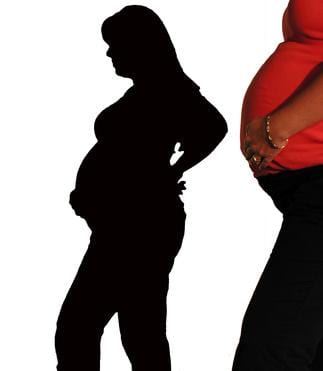Pregnancy can produce a variety of symptoms. Although some changes during your pregnancy provide enjoyment, such as your baby’s tickling movements within your uterus, others can cause discomfort and pain. While you are pregnant, you might experience abdominal distress that involves your digestive system. In addition to morning sickness and occasional constipation, you can experience the discomfort of heartburn. Although pregnancy heartburn usually resolves itself the delivery of your baby, your discomfort can cause considerable distress during your pregnancy.
Identification
Contrary to its name, heartburn has nothing to do with your heart or your circulatory system. Also called acid reflux, heartburn occurs when digested food from your stomach enters your esophagus. The stomach acids in the food can irritate the lining of your esophagus, causing discomfort and pain.
Causes
Pregnancy can increase your risk of heartburn. Your expanding uterus can create pressure on your intestines and stomach, pushing the contents of your stomach upward, into your esophagus. The increased amount of progesterone during pregnancy causes the valve between your stomach and esophagus to relax. A valve that holds the digested food in your stomach can weaken and allow food to escape into your lower esophagus.
Symptoms
You might experience a burning, aching sensation in the area behind your breastbone. An uncomfortable feeling that begins in your stomach and seems to rise up can signal the presence of digested food entering your esophagus. You might notice a sour taste in your mouth or a feeling of vomit in your throat.
Incidence
Although the symptoms of heartburn do not limit themselves to pregnant women, many women first experience this discomfort during pregnancy. Your risk of developing this condition increases as your baby grows and your uterus expands. Your greatest chance of experiencing heartburn occurs during your third trimester.
Decreasing Your Risk
The best way to deal with heartburn is to prevent it from occurring. Avoid overeating during meal times. Eat several small meals or snacks throughout the day. Cut down on your consumption of fatty, greasy and spicy foods. The March of Dimes warns against consuming chocolate, coffee and drinks that contain caffeine. Wait at least an hour after eating to lie down. Bending and lifting shortly after eating can also increase your risk of this condition.
Treatment Options
Try simple home remedies to relieve your heartburn. The American Pregnancy Association advises eating some yogurt or drinking a glass of milk to help relieve your symptoms. As soon as you begin to experience a burning feeling behind your breastbone, stir 1 tsp. honey into a glass of warm milk. Sit upright or stand, while sipping your glass of sweetened milk. Do not take any medication while you are pregnant, including over-the-counter (OTC) antacids, without consulting your doctor. If your heartburn produces significant pain and discomfort, your doctor may advise you to take medications, such as antacids.
Photo Credit
- pregnant silhouette image by Michael Cornelius from Fotolia.com





